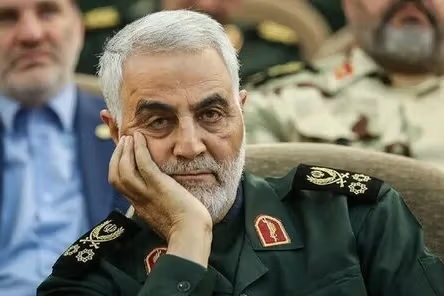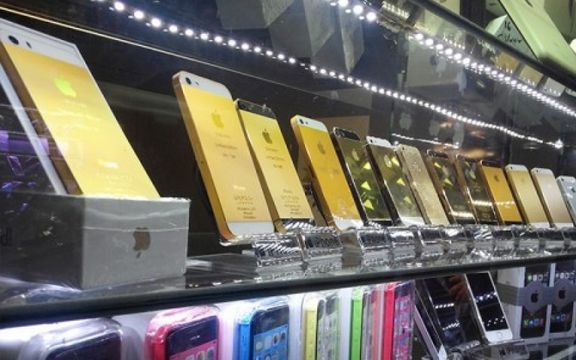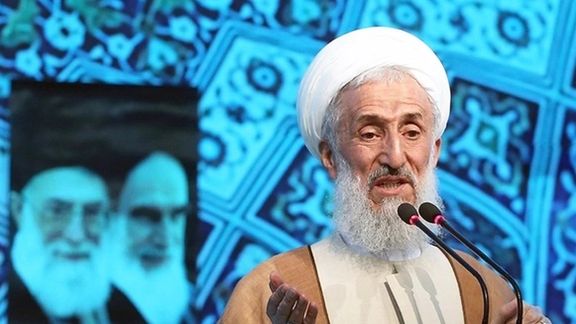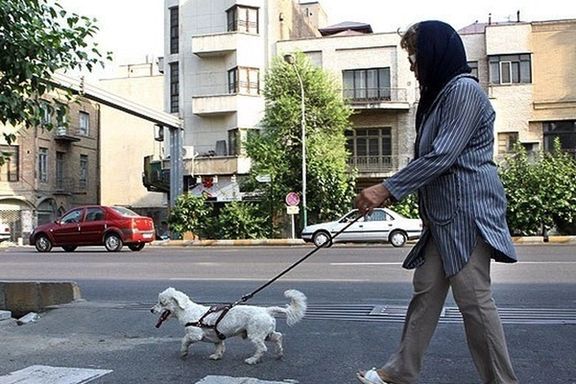Iran Threatens Revenge For Soleimani Killing If Trump Not Put On Trial

Iran's hardliner President Ebrahim Raisi has vowed revenge for the killing of Qasem Soleimani in 2020 unless former US President Donald Trump is put on trial.

Iran's hardliner President Ebrahim Raisi has vowed revenge for the killing of Qasem Soleimani in 2020 unless former US President Donald Trump is put on trial.
"If Trump and (former Secretary of State Mike) Pompeo are not tried in a fair court for the criminal act of assassinating General Soleimani, Muslims will take our martyr's revenge," Raisi said in a televised speech on Monday.
Iran’s Supreme Leader Ali Khamenei also vowed revenge in a speech on January 1, saying, “Trump and others like him will be forgotten and lost in the dustbin of history, of course after paying for their crimes in the world.”
Soleimani, who was Iran’s top military and intelligence operator outside its borders, was in charge of supporting and organizing militant proxy forces, including the Lebanese Hezbollah and Iraq Shiite militia groups that have repeatedly attacked US forces. He was killed by a US drone strike in Baghdad airport in January 2020.
Iran is engaged in indirect talks with the United States to restore the 2015 nuclear agreement abandoned by Trump in 2018. Critics say that restoring restrictions on Tehran’s nuclear program is not sufficient and sanctions should continue until it is willing to limit its ballistic missile program and alter its regional policies.

Iran spent $9 billion in foreign currency to import mobile phones in 33 months, with a large portion going for “luxury” devices with a price tag of over $600.
A report by Tasnim news agencypublished on Monday said that over 45 million cellphones have been imported from March 21, 2019, to December 21, 2021.
According to Tasnim’s data, around one quarter of the money, or about $2.3 billion was spent on importing just two million luxury phones – mainly from the American brand Apple. This is less than five percent of the total number of phones bought by the people.
The report added that despite the government raising import duties for these luxury items from five to 12 percent this year, buyers spent more money to grab the expensive models. In the first nine months of the current Iranian calendar year (starting on March 21, 2021), about $940 million was spent on high-priced phones, while the figure was $670 million for the previous year.
Buying such cellphones is too extravagant for most Iranians with ordinary nine-to-five jobs who are paid about $100 to $200 per month. However, there are a lot of Iranian officials and their family members who own the flagship models of Apple and Samsung, whose prices range from at least $1,000 to $2,400 in the Iranian market with the current exchange rate. With official government salaries, no official or Islamic Republic politician would be able to afford an expensive phone.
In comparison to the $9 billion of foreign currency spent on importing cell phones, the Iranian government spent around $15 billion during the same period to give cheap dollars to importers of food and medicines. President Ebrahim Raisi’s administration has decided to stop the indirect subsidy to save precious US dollars, but the rich and government officials keep spending more than $2 billion on expensive phones.
After the killing of Qasem Soleimani by a US drone strike at Baghdad airport in January 2020, many Iranian officials issued statements and messages on social media from their iPhones, demanding the United States leave the region. Soleimani’s daughter Zeinab Hassan also owns an iPhone 13, which costs at least over $2,000 in Iran today.
A selfie she published over the weekend was picked up by Iranian social media users who began reposting it to make the point that the phone the daughter of the former Qods (Quds) force commander uses to demand retribution for the United States, is an iPhone – not a Chinese-made phone.

Iran-affiliated hackers targeted Israeli media outlests early Monday, on the second anniversary of Qasem Soleiman's killing by a US done attack in Baghdad.
The Jerusalem Post’s website and Maariv’s Twitter account were targeted.
Hackers put a photo of a model of Israel’s Dimona nuclear plant being blown up while a hand is shooting down a missile from an agate stone ring, something Soleimani was known to be wearing all the time.
A threatening sentence attributed to the IRGC Qods (Quds) force commander was also placed on the photo in English and Hebrew that said, “We are close to you where you do not think about it". It is from one of Soleimani’s speeches that addressed former US president Donald Trump about a year before his killing.
According to the Jerusalem Post, it cannot be verified if the source of the cyberattack was from Iran or from outside the country or if they were state sponsored.
In May 2020, hackers replaced the site's homepage with an illustration of Tel Aviv burning as then-Prime-Minister Benjamin Netanyahu was swimming for a life preserver with a text saying, "Be ready for a big surprise."
Iranian officials have often threatened retribution against American and Israeli officials that they have listed as having been involved in ordering, planning and carrying out the drone strike that killed Soleimani.

The United Kingdom Maritime Trade Operations (UKMTO) said late on Sunday it had received reports of an attack on a vessel near Yemen's port of Ras Isa and an investigation was being conducted.
In an advisory issued at 2150 GMT, the UKMTO - part of Britain's Royal Navy - advised mariners to exercise extreme caution in the area.
It put the vessel's position at approximately 23 nautical miles west of Ras Isa oil terminal on the Red Sea.
The last shipping incident near Ras Isa was in late 2019 when Yemen's Iran-aligned Houthi movement briefly seized a Saudi-flagged ship and two South Korean vessels.
Saudi Arabia is leading a military coalition that has been battling the Houthis for more than six years.
The alliance has accused the Houthis of attacking shipping in the Red Sea, one of the world's busiest maritime lanes leading up to the Suez Canal.
Similar incidents have taken place in the Persian Gulf region and the Arabian Sea. Iran has seized several vessels since 2019.

Strong reactions to comments by a cleric in Iran has highlighted the vast gap between the official ideology and the people's notion of a desirable lifestyle.
At the same time, Iranian social media users have been trending the hashtag #LetUsTalk to show their protest to compulsory hijab and religious ideology.
Iranian media on Saturday quoted Tehran's Friday Prayers Imam Kazem Sedighi as having branded family planning and dog walking as examples of "promiscuity and fighting Allah."
The conservative cleric had said in his sermons on Friday, "The three sins of demanding interest on loans, creating insecurity, and loosening the foundations of the institution of family are prevalent in our society. These are tantamount to fighting Allah." He added that "Loosening the foundations of family leads to indecent behavior and debauchery, the examples of which are not observing the Islamic hijab, walking dogs, and avoiding having children."

Reformist activist Mostafa Tajzadeh reacted to Sedighi's remark in a tweet: "Anyone who knows Sedighi will not be surprised by his comment about family planning being an example of indecent behavior and debauchery. But why should such a person be appointed as Tehran's Friday Prayer leader…? Don't they see that people are throwing away clerics' turbans off their heads?"
Tajzadeh was alluding to a recent incident when a woman stepped on a cleric's turban after he insulted her and beat her with a stick for not wearing the right Islamic hijab. The video of the incident that went viral on social media.
In comments under a report about Sedighi's remarks, one of the readers of proreform Fararu website wrote:"I agree with you on walking the dog, but bringing up children needs money, which we do not have."
Another reader said: "Just remember that Sedighi is the same man who said a dead body in the morgue looked at him and laughed. Giving a man like this a status such as a Friday Prayers Imam is an insult to religion."
Yet another user replied: "People cannot have children because they have financial problems. You have created these problems. And people probably keep dogs as pets only to show their disapproval and hatred of the [Islamic Republic] government."
Meanwhile, trending the hashtag #LetUsTalk, hundreds of Iranian social media users protested to compulsory hijab and the ideology the government is imposing on them. Many responded to Iranian activist Massih Alinejad's call for posting their picture in hijab next to a picture in their usual outfit.Alinejad has initiated the hashtag by posting two of her own pictures.
She wrote in a tweet: "They told us in Iran that we would be subjected to lashes and imprisonment if we do not wear the hijab, and in the West, when we want to talk about it, they tell us to keep silent as this might be an example of Islamophobia." She told other Iranian women, "Do not remain silent. We have a right to be scared of the Islamists' ideology."
An Iranian woman posted a picture of her childhood in hijab and wrote: "This sad little girl is not the real me. She is what the Islamic Republic wants little girls to be. Another Iranian woman, Azam Bahrami, wrote: "I was punished several times for taking a book with me to the school or for singing a song to my classmates or for the color of my socks or shoes. "
Another woman using the hashtag #LetUsTalk, wrote: "Hijab is not my choice. Nor it is the choice of hundreds of thousands of other Iranian women." Another woman said: "We have been lashed and our human dignity has been undermined for walking hand in hand with someone we love, for being happy, for singing. So, #LetUsTalk about it."

An official of Iran’s drug importers union says official claims of self-sufficiency in production of raw materials for medicine and pharmaceutical products is not true.
In an interview with Iran’s labor news agency on Sunday, the deputy head of the Iranian Pharmaceutical Importers Association, Mojtaba Bourbour, said about 80 to 90 percent of the needed raw materials are imported from China and India. He added that some medicines are imported from China but sold as made in Iran.
Noting that there is no precise data on the amount of the imports of drugs packaged abroad, Bourbour said that unofficial figures indicate a $400 million dollar decrease to about $700 million since last year.
He added that most of Iran’s imports of packaged medicines are from the United States and European countries, followed by India and Turkey.
He also criticized the government’s policies that led to the decrease in imports, warning that medication prices may rise dramatically in the coming months as a result ofrestrictions by the health ministry and not foreign sanctions.
Also on Sunday, Iran’s Health Minister Bahram Eynollahi talked of further restrictions on imports of medicine and pharmaceutical products, while the Food and Drug Administration announced a ban on the imports of COVID-19 vaccines.
Eynollahi urged people to trust drugs made in Iran and warned Iranian doctors against prescribing foreign brands of medicine.